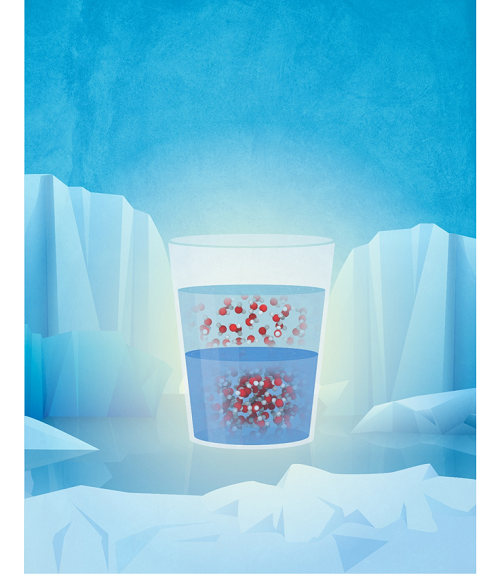Nov 30 2020
Water is vital to the development and continuation of life, as well as indispensable to life on Earth. However, it is still cloaked in mystery.
 The research team succeeded in creating water that stays unfrozen at -70 °C. Image Credit: POSTECH
The research team succeeded in creating water that stays unfrozen at -70 °C. Image Credit: POSTECH
Quite similar to how the river’s surface freezes at −20 °C but the current beneath does not, water exhibits many anomalous properties that differentiate it from other liquids. Although water has been studied for a very long time, there still exists a discussion in academia regarding the secret to water.
The liquid-liquid critical point (LLCP) hypothesis that water is made of light water (LDL) and heavy water (HDL) can illustrate the anomalous properties of water, but it has been only in theory since it was not possible to make unfreezing water below −43 °C.
A collaborative research group headed by Professor Kyung Hwan Kim from the Department of Chemistry at POSTECH and Professor Anders Nilsson’s team from the Stockholm University in Sweden have successfully produced heavy water at −70 °C and performed analysis as it changed into light water, using X-rays of <100 fs.
Reported in the recent issue of Science, the findings of the study attracted unusual interest from academic circles since it is a direct proof for the theory that water is originally made up of heavy water and light water. The study gained wider attention as Sun-joo Yoo and Sang-min Jeong, who were still undergraduate students then, also contributed to the research.
Among the different theories regarding the properties of water, the LLCP hypothesis proposes that under highly cooled conditions, water is split into heavy water and light water, and the state varies between the two waters. To confirm this theory, it is essential to make unfreezing water below −43 °C, but that has been regarded as impossible for a long time.
The researchers who had published the study results after measuring unfreezing water at −46 °C three years ago in the same journal advanced the study further and undertook an experiment to produce water that remains unfrozen momentarily at −70 °C.
Initially, the team created high-density-amorphous (HDA) ice at −160 °C, then immediately heated it with a robust laser to create heavy water at −70 °C. This water exists only for an instant and requires very bright and fast light to view it.
The team quantified this occurrence by using X-rays from Pohang fourth-generation accelerator (PAL-XFEL), referred to as the “light of dreams,” to momentarily quantify the unfreezing water at −70 °C. Then, the researchers viewed the process of the phase change of this heavy water into light water.
The study findings are direct proof for the hypothesis that water is actually made up of two liquid phases—light water and heavy water—and is projected to illuminate the causes of different properties of water associated with this. Mainly, academic groups assess this as a significant clue to primarily understand why water is vital and appropriate for life.
This research finding will settle the long-standing debate among researchers who have questioned the secret of water and will serve as a starting point for solving the mystery of water and life by understanding its anomalous properties. It is also noteworthy that undergraduate students contributed to a great extent in this important research which will have notable significance in basic science.
Kyung Hwan Kim, Professor, POSTECH
This study was supported by the Young Researcher Program of the National Research Foundation of Korea financially supported by the Ministry of Science and ICT, and made use of the 4th generation accelerator PAL-XFEL of the Pohang Accelerator Laboratory in Korea.